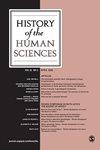从两种思想到思想:在漫长的20世纪60年代,“反精神病学”在英国电影和电视中的传播
IF 0.5
2区 历史学
Q2 HISTORY & PHILOSOPHY OF SCIENCE
引用次数: 2
摘要
本文探讨了20世纪60年代英国电影和电视中“反精神病学”的传播,重点关注了备受争议的英国广播公司电视剧《两个头脑》(1967年)及其翻拍电影《家庭生活》(1971年)。这些电影的灵感来自R.D.Laing关于精神分裂症病因的思想,被理解为将进步电影制作人(Ken Loach、Tony Garnett、David Mercer)和进步精神病学家(Laing、David Cooper、Aaron Esterson)的个人和政治动机结合在一起。根据对制片人加内特和导演洛奇的从业者采访,以及对这些电影的制作和接收的广泛档案研究,本文对之前关于反精神病学的流行以及该运动与英国主流精神病学的两极分化的研究提出了质疑。虽然《In Two Minds and Family Life》的上映确实加剧了“反叛”反精神病学家与威廉·萨金特(William Sargent)等强硬行为学家之间的敌对关系,但更广泛的精神病领域在很大程度上欢迎这些电影对心理健康意识的贡献,并利用宣传来反对业内“战斗”的想法。这包括英国领先的心理健康组织全国心理健康协会在1972年更名为MIND时,将Loach和Laing视为吸引当代观众的榜样。这篇文章有助于对媒体和心理健康领域之间复杂互动的历史理解,以及最近对反精神病学和英国正统医学之间明显分裂的观点提出质疑的学术研究。本文章由计算机程序翻译,如有差异,请以英文原文为准。
From In Two Minds to MIND: The circulation of ‘anti-psychiatry’ in British film and television during the long 1960s
This article explores the circulation of ‘anti-psychiatry’ in British film and television during the long 1960s, focusing on the controversial BBC television play In Two Minds (1967) and its cinema remake Family Life (1971). These films were inspired by R. D. Laing's ideas on the aetiology of schizophrenia, and were understood as uniting the personal and political motivations of progressive film-makers (Ken Loach, Tony Garnett, David Mercer) and progressive psychiatrists (Laing, David Cooper, Aaron Esterson). Drawing upon practitioner interviews with producer Garnett and director Loach, and extensive archival research on the production and reception of these films, this article contests previous scholarship on the popular circulation of anti-psychiatry and the movement's perceived polarisation from mainstream British psychiatry. While the reception of In Two Minds and Family Life did intensify an adversarial relationship between ‘rebel’ anti-psychiatrists and hard-line behaviourists such as William Sargant, the wider psychiatric field largely welcomed the films' contributions to mental health awareness and used the publicity to counter the idea of a ‘battle’ within the profession. This included leading UK mental health organisation the National Association for Mental Health looking to Loach and Laing as models for engaging contemporary audiences as it rebranded to MIND in 1972. This article contributes to historical understandings of the complex interactions between the fields of media and mental health, as well as recent scholarship challenging the idea of a clear split between anti-psychiatry and British medical orthodoxy.
求助全文
通过发布文献求助,成功后即可免费获取论文全文。
去求助
来源期刊

History of the Human Sciences
综合性期刊-科学史与科学哲学
CiteScore
1.60
自引率
11.10%
发文量
31
审稿时长
>12 weeks
期刊介绍:
History of the Human Sciences aims to expand our understanding of the human world through a broad interdisciplinary approach. The journal will bring you critical articles from sociology, psychology, anthropology and politics, and link their interests with those of philosophy, literary criticism, art history, linguistics, psychoanalysis, aesthetics and law.
 求助内容:
求助内容: 应助结果提醒方式:
应助结果提醒方式:


